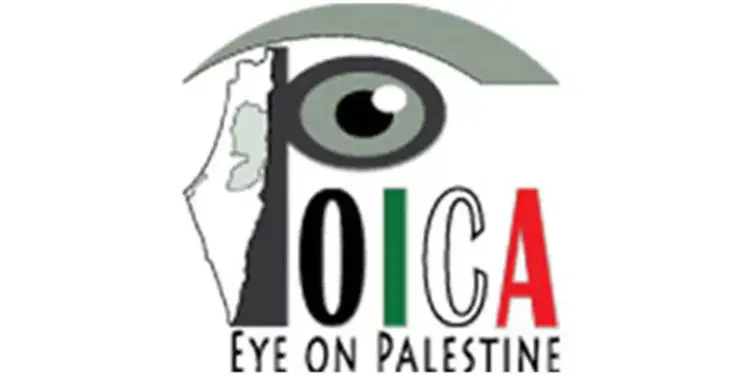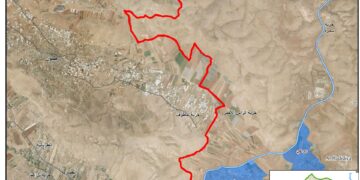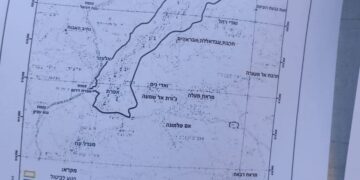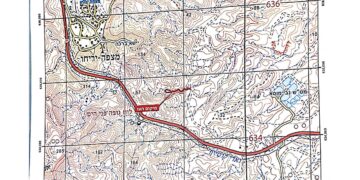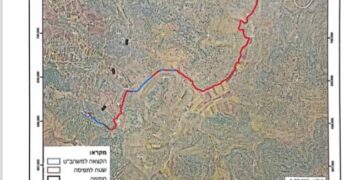On October, 21, 2009, the Israeli Occupation Authorities issued the Palestinian residents of Fasayel and Al Jiftlik villages in the Jordan Valley 21 military orders notifying them to halt the construction of their shelters which are made of tin alleged for lacking proper authorization.
The Israeli halt of construction orders come in sequence to series of demolishing orders issued by the Israeli Army over the past few years in both villages that have been a target of the Israeli Army for a long time as several military bases of the Army and Israeli settlements surround the villages and control the movement of the residents and accesses to their agricultural lands and other areas in the West Bank including their ability to market their agricultural products.
In Fassayel village, 11 Palestinian families have received halt of construction orders. The owners are listed in Table 1:
|
Table 1: Threatened Palestinian Houses in Fasayel Village
|
|
No.
|
Owner
|
Property
|
|
1.
|
Naser Mousa Judei’ Jaddou’.
|
2 bedroom house and Barracks
|
|
2.
|
Jihad Naser Mousa Judei’.
|
2 bedroom house and Barracks
|
|
3.
|
Deif Allah Muhammad Judei’ Jaddou’
|
2 bedroom house and Barracks
|
|
4.
|
As’ad Mohammad Judei’ Jaddou’.
|
2 bedroom house and Barracks
|
|
5.
|
Ahmad Judei’ Jaddou’
|
2 bedrooms house and Barracks
|
|
6.
|
Khalid Judei’ Jaddou’
|
residential and cattle barracks
|
|
7.
|
Mohammad Ibrahim Suleiman Abu Khirbeesh.
|
residential and cattle barracks
|
|
8.
|
‘Omar Ibrahim Suleiman Abu Khirbeesh
|
residential and cattle barracks
|
|
9.
|
Suleiman Mohammad Hussein Rashaida
|
residential and cattle barracks
|
|
10.
|
Hasan Mohammad Hussein Rashaida
|
residential and cattle barracks
|
|
11.
|
Mahmud Ibrahim Suleiman Abu Khirbeesh
|
residential and cattle barracks
|
Source: Fasayel Village Council – 2009
14 Kilometers north, lies the village of Al Jiftlik where ten Palestinian families received halt of construction orders. The owners of the threatened residencies are:
|
Table 2: Threatened Palestinian Houses in Al Jiftlik Village
|
|
1.
|
Yousef Ibrahim Hassan Ghwanmeh
|
Cattle barracks
|
|
|
2.
|
Ahmad Ibrahim Hassan Ghwanmeh
|
Cattle barracks
|
|
|
3.
|
Mohammad Mit’eb Mahmud Id’eis.
|
cattle and residential barracks
|
|
|
4.
|
Smir Ahmad Hamed Bisharat.
|
Cattle and residential barracks
|
|
|
5.
|
Hassan Hussein Mirshed Rsheid.
|
Cattle and residential barracks
|
|
|
6.
|
Al Jiftlik Secondary School.
|
|
|
|
7.
|
Qeis Saleh Shihadeh Nassasrah.
|
Inhabited house
|
|
|
8.
|
Khalid Mohammad Hassan Jahalin.
|
residential barracks
|
|
|
9.
|
Suleiman Salman Erhaeil Najadeh.
|
Cattle barracks
|
|
|
10.
|
Khalid Mohammad Ibrahim Abu Hannieh.
|
15 dunums of agriculture lands cultivated with fruits and vegetables
|
|


It is worth mentioning that the threatened Palestinian barracks and homes are located in the lands of area “C”, which is, according to Oslo Interim Agreement II of 1995, falls under the full Israeli security and administrative control. The residents of land located within areas classified as ‘C’ must continue to get building permits from the Israeli ‘Civil Administration if they to build a house, a tin shack or foster land utilization. It is also worth mentioning that the vast majority of land was declared closed military area by the Israeli Government since 1967, when Israel Occupied the West Bank Territory including east Jerusalem and the Gaza Strip and hence prohibited any kind of development to that area. Therefore, Palestinians living in the Jordan Valley area are compelled to build without authorization to deal with population growth and the increasing need for education, health, and other necessities to their daily lives. Map 1

Map 1: threatened Palestinian Properties in Fasayel and AL Jiftlik
New master plan for Fasayel Village:
In 2008, the Israeli planning Department operating within the Israeli Civil Administration decided to issue exclusive master plans for a number of Palestinian villages located in area C in the West Bank; the village of Fasayel in the Jordan Valley was one of them. This shift in the Israeli civil administration policy came as a result of an effective pressure from the international Quartet and the Office of its representative Tony Blair Tony Blair.
However, and regardless of the motivation behind this change of Israeli attitude, the master plans presented by the Israeli civil administration for the selected Palestinian communities located in area “C” did not even meet the minimum needs of Palestinian communities. Furthermore, the Israeli civil administration did not take into consideration the current status of the communities or its future needs. Moreover, and despite the fact that the threatened Palestinian houses and barracks in Fassayel village are located in the area of the new proposed master plan adopted by the Israeli Civil Administration, Israel is going on with its colonial practices to ethnically cleanse Fasayel village and the rest of the Palestinian villages and communities in the Jordan Valley in order to serve the Israeli colonial and expansionist agenda.
On the other hand, Israel made sure that the master plans assigned to Israeli settlements in the OPT are well and sufficient to cope with anticipated future growth of settlers’ population, in addition to easily formulated procedures for building and development plans. See Table 3 & Map 2
Table 3: Fassayil village vs. the near by Pezael settlement
|
|
Built-up area
Dunums
|
Master plan area
Dunums
|
Built-up area outside the master plan- dunums
|
|
Fassayil (Palestinian)
|
64
|
122
|
18
|
|
Fezael (Israeli settlement)
|
5142
|
11369
|
0
|
Map 2: Comparison between Fasayel Village and Pesael settlement
Resource: GIS Unit – ARIJ 2008
Al Jiftlik & Fassayel Communities at a glance
Al Jiftlik, a Palestinian village located to the north of Jericho city, in the central part of the Jordan Valley and has a population of 5,124 (PCBS 2008) The village is bordered by military bases and settlements from its northern, western and southern directions, and bypass road number 90 from its eastern side. While Fassayel village, is inhabited by 1048 citizens (PCBS 2008) and is set on a built-up area of 194 dunums. The village is bordered by Peza’el sentiment from its north, Tomer, Gilgal, Netiv Hagdud and Niran settlements from its south; bypass road 90 from its east and open spaces from its western side.
The fact that Al Jiftlik and Fasayel villages lie in area identified by the Israeli Army as closed military area has a lot in what is happening there. More than that, the fact that the entire West Bank territory is occupied and administered by the Israeli Civil Administration, which is basically the Israeli Army makes any decision issued from any Israeli court, including the Supreme Court irrelevant and insignificant, the Israeli Army has the power to override and discard any decision from any Israeli court under the pretext of “security” and “the well being of the state and people of Israel.” On the ground, there are military courts and they are the ones entitled to issue any decision that is binding to the Israeli Army.
Legal & International Status
The systematic Israeli campaign of house demolitions is carried out by the Israeli Army and flagrantly violates International humanitarian law, International conventions and various United Nations resolutions.
According to the Fourth Geneva Convention Israel is prohibited to demolish Palestinian houses under Article 53 of the Convention which provides that: ‘Any destruction by the Occupying Power of real or personal property belonging individually or collectively to private persons, or to the State, or to other public authorities, or to social or cooperative organizations, is prohibited, except where such destruction is rendered absolutely necessary by military operations’.
Under the same convention, Article 147 provides that ‘extensive destruction and appropriation of property, not justified by military necessity and carried out unlawfully and wantonly’ is a grave breach of international law.
Moreover, the International Convention on the Elimination of All Forms of Racial Discrimination (1965) Article 5 provides that: ‘States’ or Parties must undertake to prohibit and eliminate racial discrimination in all of its forms and to guarantee the right of everyone, without distinction as to race, color, or national or ethnic origin, to equality before the law, notably in the enjoyment of the following rights: (e) in particular … (iii) the right to housing’.
In the year 2004 the United Nations Security Council called on Israel to stop demolition of Palestinian homes under Resolution No. 1544-(2004), the resolution states: ‘The Security Council called on Israel to respect its obligations under international humanitarian law, particularly the obligation not to undertake home demolitions contrary to that law’
Prepared by


